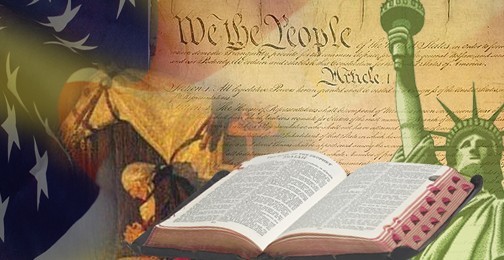
Written by Barrett Duke, Ph.D., Vice President for Public Policy and Research -The Ethics & Religious Liberty Commission
People of faith are on a collision course with the radical homosexual agenda. It is inevitable. In order for the radical homosexual agenda to be fully implemented, people of faith are going to have to be silenced and marginalized. The radical homosexual community will have to violate our religious liberty and our consciences in order to achieve this.
At this very moment, three issues move us closer to what I believe is an eventual clash. These issues affect our religious liberty in unique and distressing ways. I will mention two related to each.
Same-sex marriage
First, same-sex marriage will lead to the violation of our children’s consciences. Many of us send our children to government-run schools armed with our convictions and the Bible’s teachings about homosexuality. Yet our children are already getting a much different message in some of them. Imagine what will happen if the government feels compelled to indoctrinate our children about the new civil right of same-sex marriage. We can expect government to look for ways to achieve this. The “struggle for same-sex marriage” will be detailed as a civil rights triumph in their history and civics textbooks. Our children will be exposed to speakers who will “help” them understand and accept same-sex marriage. Doubtless, many more insidious means will be deployed to indoctrinate our children and undermine their faith convictions about homosexuality.
Second, our freedom to choose our associations based on our religious convictions will be trampled. Legalization of same-sex marriage will create a situation in which the government will prohibit religious groups from using convictions about homosexuality as a determining factor in membership. This will extend to our participation in activities and access to religiously based accommodations, like church camps or retreats. What we have been seeing on this front lately is just the beginning. Imagine if we get to the place where same-sex marriage is treated as a civil right and all of the power of the United States government is brought to bear on making sure that no one involved in a same-sex marriage has his or her civil rights violated. It will not be possible for the government to secure the civil rights of those who are in a homosexual marriage and simultaneously accommodate our religiously held beliefs about homosexuality.
Employment protections
The Employment Non-discrimination Act (ENDA) is a perfect example of the coming conflict. This bill is live today in Congress and it threatens religious liberty. First of all, our ability to hire people who share our values will be taken away. A version of this bill provides an exemption for religious groups, but not all of their religious activities. The provision defines what is to be considered an exempt religious activity. So a church may be exempted from the requirement to extend employment to homosexuals, but this same exemption will not be available to other faith-based activities, like bookstores, daycare centers, or retreats. ENDA will prevent churches from applying their faith convictions about homosexuality to all of their hiring decisions.
Second, our faith will lead to accusations of discrimination in the workplace. These non-discrimination laws will treat as bigots all who communicate any kind of negative conviction about homosexuality in the workplace. Part of the current bill reads: ‘It shall be an unlawful employment practice for an employer to adversely affect the status of the individual as an employee because of such individual’s actual or perceived sexual orientation.” This language is so broad in its scope that a homosexual would have legal grounds to sue an employer who keeps a Bible on his desk. He can simply argue that by displaying a Bible, the employer is publicly identifying with its condemnation of homosexual behavior and thereby “adversely affecting” his status as an employee.
Hate crimes
Hate crimes bills also threaten our religious liberty. First, our faith conviction about homosexuality could lead to federal prosecution for hate crimes. Under hate crimes statutes a Christian who happens to engage in an act of violence against a homosexual could be charged with a hate crime simply because he believes the Bible’s teachings about homosexuality, regardless of whether that has anything to do with the crime. No one should engage in acts of violence against a homosexual simply because he is a homosexual. But neither should someone’s religiously held beliefs about homosexuality be the cause of his prosecution.
Second, hate crimes legislation could have a chilling effect on religious speech that is critical of homosexuality. A precedent already exists. Today some pastors are reluctant to speak about political issues because they fear the loss of their tax exempt status. To assure compliance with the law, they even shy away from political speech that is still permissible. We can expect a similar response from some pastors if they begin to fear being charged with a hate crime for potentially inciting violence against homosexuals through their preaching or teaching or if they fear endangering their tax exempt status.
These are all serious issues. They must be addressed. Our faith and the radical homosexual agenda are on track for a cataclysmic conflict. If the radical homosexual agenda is codified into law, our own government will be arrayed against us and our struggle to protect our religious freedom. We can fight this battle now or we can fight it later, but we are going to fight this battle. We must stand up and protect our freedom to believe and to practice our faith according to God’s leading, not governments’.






















